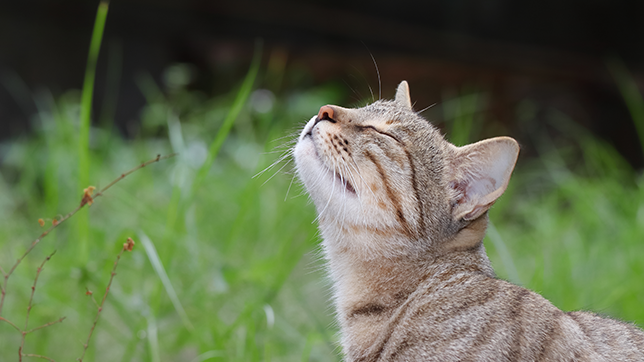1st September 2023
What smells do cats hate?
Cats communicate through their sense of smell, though they also use scent to learn about their environment. So, it’s not surprising that cats have a super sensitive nose!
If you’re hoping to deter toileting tabbies from visiting your garden, using strong smells may work. However, some substances are toxic to cats and should never be used around them.
It’s also useful for pawrents to know the smells cats hate, to avoid upsetting their feline friends at home!

Lavender
Lavender is a lovely, calming scent to many of us, but to moggies it smells terrible. Even the most curious cats can’t stand the smell and will avoid lavender plants where possible - fortunately, as eating lavender is poisonous to them. If you do think your cat has eaten lavender though, please get in touch with your vet as soon as possible to prevent liver damage in your feline friend.
Please don’t plant lavender when trying to keep cats out of your garden.
Peppermint
Peppermint contains a substance called salicylate, which is toxic to cats, and most moggies will avoid peppermint because they think it pongs. However, there’s something extra in peppermint that smells a little like catnip, which can attract some.
Planting peppermint should be avoided when trying to keep cats away.
Marigolds
Marigolds might stink to most feline friends but many cats don’t mind these brightly coloured flowers. This means marigolds aren’t likely to stop cats doing business in your garden!
Eucalyptus
Another plant that smells foul to felines is eucalyptus. Just like lavender and peppermint, eucalyptus is poisonous to cats and shouldn’t be used to keep cats away from the garden.
Remember: Check any calming plug-ins or essential oil diffusers and other sprays and make sure you avoid any that include eucalyptus oil.
Citrus
While the sweet scents of oranges, lemons, and other citrus fruits may be appealing to us, they’re disgusting to cats. The good news is you can safely use citrus peel around your favourite flowers to keep toileting tomcats at bay.
Bananas
You may have seen some videos on social media of ‘cats vs cucumbers’; well, our feline friends detest the smell of bananas too, and it sends them… bananas!
Vinegar
Pawrents who use vinegar as part of a chemical-free cleaning routine may already know that cats can’t stand the stuff. Vinegar has a sour smell that makes many moggies stay away from it. In fact, some cats might mark areas cleaned with vinegar, just to get rid of the strong scent!
Coffee
Ever wondered why your cuddly cat runs a mile when you pour a morning cup of coffee?
Cats can’t stand coffee. It’s thought that the potent smell of coffee has something to do with caffeine being toxic to felines. So, make sure you don’t leave your cat unattended around your morning fuel, just in case!
Gone-off food
Sometimes, a cat’s supremely sensitive sense of smell works against pet parents. Plenty of cats won’t touch food that’s slightly spoiled. And by ‘spoiled’ we’re including food that contains medicine, or a worming tablet, which most cats detest!
Many moggies will turn their nose up at food that’s been sat in their bowl, too. While it can seem wasteful, wet cat food shouldn’t be allowed to sit out for more than an hour or two before being thrown away, especially in the summer.
Dirty litter trays
Nobody likes a dirty environment, so if their favourite place to poop is pongy, it’s fair for felines to want to avoid it.
Other smells cats hate
There are many other scents that are offensive to our feline friends, including:
- Geranium (toxic).
- Rosemary.
- Thyme.
- Cinnamon (can be toxic in big amounts).
- Tea tree (toxic).
- Pine (toxic).
- Chilli powder (harmful).
- Peppers.
- Mustard.
- Menthol (toxic).
Remember: If you think your cat might have swallowed something poisonous, contact your vet straight away.
Here are some signs your feline friend may have eaten something toxic:
- Extremely itchy skin.
- Dribbling.
- Vomiting.
- Refusal to eat.
Although spreading scents in your garden might prevent curious cats from pooping there, remember that cats have the right to roam by law and are legally allowed to visit your garden. It is also an offence, under the Animal Welfare Act 2006, to harm a cat in any way (even by accident). So, we should never use harmful plants and/or products to keep cats away.
If you’d like advice about safely dealing with pooping toms visiting your garden, have a chat with your local vet!
Looking for more cat advice?
We’ve written some handy cat advice guides, to help you unlock the secrets of your mysterious moggy.
Need cat insurance?
Cat insurance can help cover the cost of veterinary treatment if your cat gets injured or falls ill.
